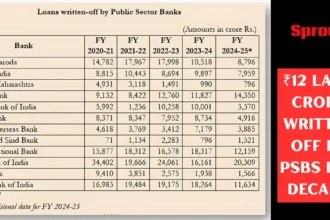Police can’t serve accused notice via WhatsApp
• No More Digital Summons, Says SC
• Police Can’t Text the Law, Rules SC
• SC Slams WhatsApp Notice Trend
Unmesh Gujarathi
Sprouts News Exclusive
Contact: +91 9322755098
The Supreme Court has ruled that police cannot serve notices to accused persons via WhatsApp or other electronic means under CrPC, 1973 or BNSS, 2023. All States and UTs must issue standing orders to follow only legally approved service modes. The directive ensures strict adherence to due legal process.
SC Clarifies: WhatsApp, Email Not Valid for Criminal Notices
In a landmark ruling with significant implications for law enforcement practices across India, the Supreme Court has firmly declared that police cannot serve criminal notices to accused persons via WhatsApp, email, or any other electronic medium. The ruling, passed on January 21 by a bench comprising Justices M.M. Sundresh and Rajesh Bindal, underscores the legal sanctity of procedural compliance under the Criminal Procedure Code (CrPC), 1973 and the newly introduced Bhartiya Nagrik Suraksha Sanhita (BNSS), 2023.
The bench directed all States and Union Territories to issue standing orders to their respective police departments, ensuring that notices issued under Section 41A of CrPC, 1973, and Section 35 of BNSS, 2023 must follow the legally prescribed physical service protocols only.
“It is made amply clear that service of notice through WhatsApp or other electronic modes cannot be considered or recognised as an alternative or substitute,” the apex court stated unequivocally.
Click Here To Download the News Attachment
Court Accepts Legal Concerns Raised by Amicus Curiae
The decision was influenced significantly by senior advocate Sidharth Luthra, appointed as amicus curiae in the matter. Luthra raised red flags about increasing misuse of electronic communication in criminal proceedings. He cited cases where accused individuals failed to appear before investigating officers after receiving Section 41A notices via WhatsApp—arguing such practices violate due process and dilute legal accountability.
According to Luthra, digital delivery bypasses the mandated safeguards and traceability embedded in the official mode of serving summons or notices. “The police must not circumvent the mandate of Section 41-A or Section 35 by using unverified digital means,” he urged.
The court passed the ruling during the hearing of the Satender Kumar Antil case, which has evolved into a larger judicial effort aimed at streamlining arrest procedures and bail compliance nationwide.
Mandatory Compliance Ordered for All States and High Courts
Reinforcing the need for systemic compliance, the Supreme Court ordered the Registrar Generals of all High Courts and the Chief Secretaries of every State and UT to enforce the new directive within three weeks. The bench also instructed High Court committees to convene monthly meetings to review both pending and implemented decisions.
Authorities are now required to submit monthly compliance reports, ensuring that the judgment translates into practice at “all administrative and operational levels.” This step is expected to increase institutional accountability and reduce the chances of arbitrary arrests or non-appearance claims.
Legal Stakeholders Welcome the Ruling
Legal experts and law enforcement analysts have praised the verdict as a necessary course correction in an era increasingly reliant on informal digital communication. The judgment clarifies that digital convenience must not override statutory procedures—especially in criminal justice, where procedural flaws can compromise personal liberty.
According to the Sprouts News Investigation Team (SIT), several recent high-profile cases revealed procedural lapses where notices were sent electronically without acknowledgment or legal certification. This ruling now sets a uniform standard that will apply across jurisdictions, preventing police from using unofficial shortcuts.
Also Read: Illegal ₹32.77 Lakh Fee Withdrawn by D.Y. Patil Medical College.
SIT Observations: Tech Must Align With Rule of Law
While digitization of the criminal justice system is important, it must align with the Constitution and legal statutes, not override them. The Sprouts News Investigation Team (SIT) notes that this decision may prompt the Ministry of Home Affairs and state police departments to revisit and revise their Standard Operating Procedures (SOPs).
The judgment is also expected to impact ongoing law enforcement reforms under the BNSS, 2023, especially as several provisions focus on digital record-keeping and evidence presentation.
Physical Notice Service is Non-Negotiable
In conclusion, the Supreme Court’s firm stance reaffirms that while technology may offer speed, it cannot replace procedural justice and due process. The ruling mandates that personal liberty cannot be compromised by informal or non-verifiable communication methods. Police departments must now fall in line with the highest court’s expectations, ensuring transparency, legitimacy, and constitutional adherence.




